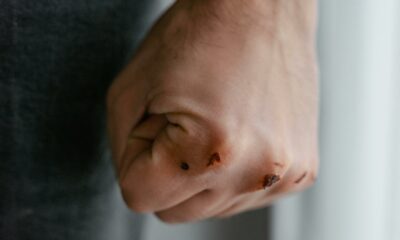News
Court Hears of Amber Lee Hughes’s Troubled Childhood and Emotional Trauma During Sentencing

Court Hears of Amber Lee Hughes’s Troubled Childhood and Emotional Trauma During Sentencing
A haunting picture of emotional pain, childhood trauma, and mental health struggles emerged in the Johannesburg High Court this week as social worker Carina Wolmarans detailed the life of convicted murderer Amber Lee Hughes.
Wolmarans, who specialises in pre-sentence reports, testified on October 27 as the court continued hearings to determine an appropriate sentence for Hughes, found guilty of the rape and premeditated murder of four-year-old Nada-Jane Chalita earlier this year.
Her testimony painted a portrait of a woman whose life had been marked by instability and psychological distress long before the horrific crime that shocked South Africa.
@southern.courier Carina Wolmarans, a social worker in private practice, will provide a pre-sentence report to assist the court with mitigation considerations. Amber Lee Hughes, found guilty on August 28, 2025, of the r*pe and premeditated m*rder of four-year-old Nada-Jane Chalita, is set to appear in court for sentencing on October 27 and 28. Full story to follow on southerncourier.co.za #AmberLeeHughes #NadaJaneChalita #Murder ♬ The Court – Adrián Berenguer
A Life Shaped by Trauma
According to Wolmarans, Hughes’s childhood was defined by emotional turmoil and a persistent sense of rejection. She told the court that Hughes suffered from low self-esteem and feelings of isolation, particularly as a result of being bullied for her weight during her formative years.
“Amber often felt unworthy,” Wolmarans said, explaining that these feelings led to self-harming behaviour and multiple suicide attempts as a teenager. Her fragile emotional state, the court heard, was compounded by devastating personal loss.
In 2005, Hughes’s mother, who had been left disabled after a car accident, became dependent on pain medication and alcohol. The spiral ended tragically when she took her own life, an event that deeply scarred Hughes.
The court heard that Amber, still young at the time, was the one who discovered her mother’s naked body in a hospital bed, a memory she reportedly never recovered from.
Mental Health and Diagnosis
Following these early traumas, Hughes was diagnosed with post-traumatic stress disorder (PTSD) and began receiving treatment from psychiatrists and psychologists at the age of 14. Over the years, doctors also diagnosed her with borderline personality disorder, a condition often associated with emotional instability, impulsive behaviour, and difficulties forming stable relationships.
However, Wolmarans’s testimony led to a tense exchange in court when Judge Richard Mkhabela and State Advocate Rolene Barnard reminded her to limit her commentary to social work observations, cautioning that medical diagnoses should be left to psychiatrists and psychologists.
Despite this, Wolmarans continued to describe the emotional instability she observed in Hughes, a woman she said oscillates between guilt, remorse, and self-loathing.
Regret and Reflection
At one point, Wolmarans told the court that Hughes had expressed deep regret for her actions, including the drowning of young Nada-Jane Chalita, the crime that led to her conviction.
“She is sorry,” Wolmarans said softly. “She said she wishes she could take it back.”
The chilling murder of Nada-Jane, which took place under circumstances that still unsettle many, sent shockwaves across Johannesburg and reignited conversations about mental health and accountability in criminal justice.
Public Reaction and Calls for Understanding
While few can forgive the brutality of the crime, public reaction to the revelations from court has been divided. On social media, some South Africans expressed sympathy for the damaged childhood that preceded the violence, arguing that untreated trauma can lead to tragic outcomes. Others, however, insist that no amount of personal suffering can excuse the murder of a child.
“Many people grow up with trauma and never harm anyone,” one user posted on X (formerly Twitter). “She deserves justice, not pity.”
Criminologists say such cases raise important questions about how South Africa’s legal system balances punishment with rehabilitation, especially in cases involving psychological illness.
Case Continues
As sentencing proceedings resume, Judge Mkhabela is expected to weigh Wolmarans’s report alongside psychiatric assessments and testimonies from both the defence and prosecution.
Whatever the final judgment, the Hughes case has already become a somber reflection of how trauma, neglect, and mental illness can collide with devastating consequences.
And for many following the case, one question lingers: Could this tragedy and others like it, have been prevented with earlier intervention and care?
{Source: The Citizen}
Follow Joburg ETC on Facebook, Twitter , TikTok and Instagram
For more News in Johannesburg, visit joburgetc.com



























